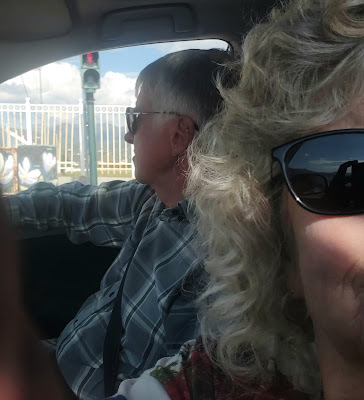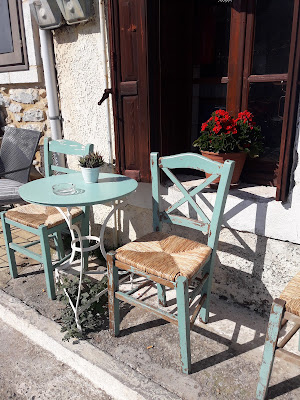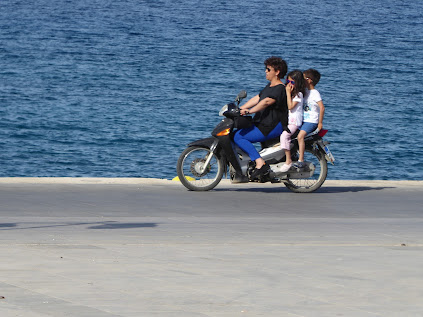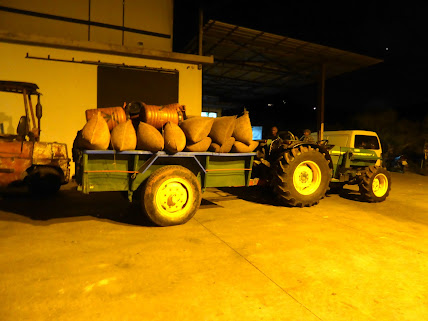With the toss of a cross the holiday season came to an official end last week and winter arrived in the Greek village we call home.
 |
| Ready for the Blessing of the Water in Agios Nikolaos |
The Blessing of the Water, which involves tossing a cross into the rather frigid waters of the village fishing harbor and having it retrieved by a brave - young - swimmer, is an annual religious tradition in the Greek Orthodox religion. It commemorates Christ's Baptism in the Jordan River. Throughout the country similar ceremonies and pageants took place on January 6th, the day known as Epiphany or Theophany on religious calendars.
 |
| On the way to the harbor ceremony |
In our village of Agios Nikolaos in the Mani region of the southwestern Peloponnese, the day dawned picture-perfect, with blue sky and sunshine. Harborside tables at restaurants and cafes were filled long before the bells of the church (also named Agios Nikolaos, the patron saint of sailors) began announcing the mid-morning service.
 |
| Pappas Panayotis in Agios Nikolaos |
Villagers and visitors alike were waiting for the colorful procession of officiants and congregants to make its way from the church to the harbor's parking lot.
 |
| The ceremony at harborside |
Once there, our village priest, Pappas Panayotis, offered a brief service, blessed the cross and tossed it into the water. Young swimmers stood on the harbor's breakwater, opposite the parking lot and launched themselves into the water to retrieve the cross as soon as the Pappas released it.
 |
| One of two brave swimmers helped from the water |
Just like that, the ceremony ended. The swimmer who retrieved the cross was blessed. The crowd shifted toward our small fish market to the side of the parking lot where the counter -- normally used to display the catch of the day -- had been turned into a magnificent banquet table, filled with platters of sweets and savory goodies donated by the local bakery, restaurants and individuals.
 |
| Table begins to fill with donated tasty treats. |
Then Came Winter
 |
| Pantazi Beach just like Hawaii |
This stunning beach is walking distance from our home at the base of the hill. In tourist season it is jam-packed with tourists and sunbeds but on this day, it was empty and inviting. The slight breeze, the warmth, and the wave action that day reminded us of similar scenes in Hawaii.
 |
| What a difference a day makes in winter here. . . |
Weather here could be described as Longfellow once poetically wrote of the little girl with a curl: 'When she was good, she was very good, and when she was bad, she was horrid.' Further down the beach, the giant waves had carried driftwood, rubble and large stones onto the roadway. The skies were leaden, and the rain came - at times - in buckets. Such is winter in our slice of Greece.
 |
| This Saturday night in the village |
Winter weather definitely puts our village into hibernation. Olive harvest is coming to a close. Only a few fishing boats remain in the harbor. The slash from olive groves is being burned as weather permits. Restaurants close for maintenance. At night streets are deserted.
However, gardens are flourishing again, revived by the rain and cool temperatures. Roses and geraniums are in bloom, reminding us that spring will soon be on its way.
 |
| My rose, a bit wind-beaten, in the garden |
Spring seems far distant though while we have a low temperature advisory in our area. It dipped to 37F/2.2C two nights ago and while that is balmy for some of you reading this, I can tell you it is COLD for here. The highest peaks of the Taygetos Mountains are finally iced with snow. We've had our oil furnace, fireplace and electric wall heaters going in tandem and separately for days.
 |
| A snowy peak of the Taygetos Mountain peeks out |
But the storms come and go relatively quickly here compared to our old Washington State weather and we should soon be back in the low 60F's/15C's. Yesterday we had sunshine and by today the rain is again pouring down.
 |
| Gray days in Greece |











































